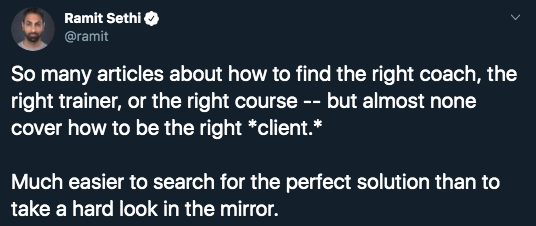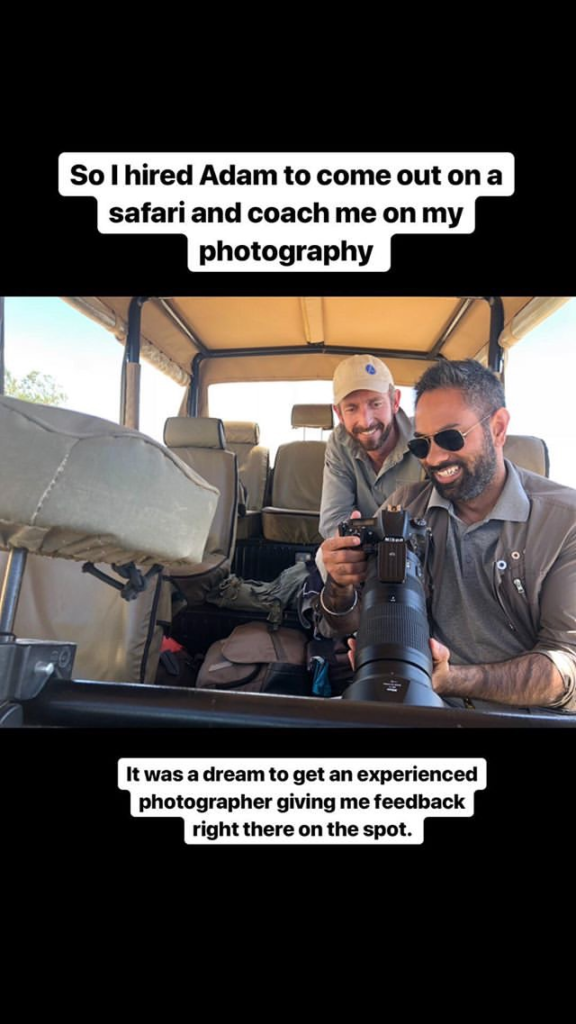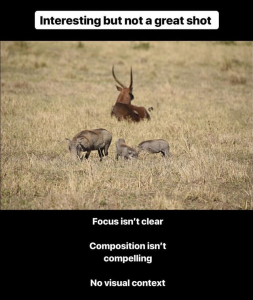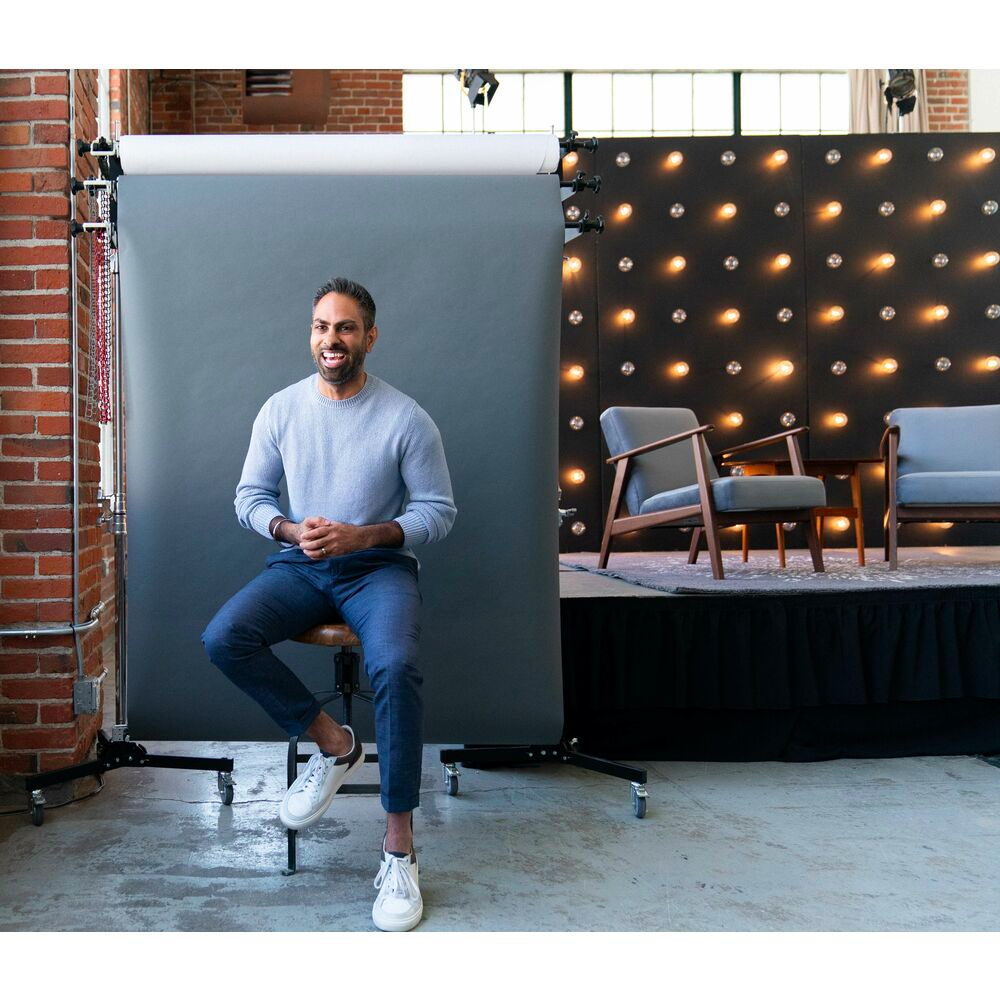
When I was a kid, my dad taught me how to shoot photography on a manual camera. I even learned how to develop my own film in a darkroom. But it’s been years since I practiced my photography skills.
I really noticed it on my honeymoon last year. My iPhone was fine for most of our trip, but once we got to Kenya, I regretted not having a better camera. Fortunately, one of the lodges we stayed at offered camera rentals, so one day, I went out on safari and took hundreds of photos.
Unfortunately…they sucked. So that night, I went back to our lodge, where they had a “photographer in residence,” and I asked if I could hire him to come out with me the next day on safari and re-teach me how to shoot.

My photos turned out WAY better. There was nothing like having a coach right there on the spot, giving me instant feedback, to help me get better. More importantly, I fell back in love with photography.


Before & after. All with the help of a coach.
So last Friday, I went to a photography class in NYC. It was a total “101” class, just the basics. I already knew a lot of the basics, but I love the process of starting from the ground up. There are times to care about efficiency…and there are times to slow down and enjoy the process.
That’s the mindset of a student who’s ready to learn.
Every time I post something like this, I get tons of emails asking, “Which class was it???”
Which reveals the real insight about becoming great: A lot of us debate whether this is a good book, or that’s the right program…
…but very few of us ask a more important question:
I’ve had the opportunity to create 25+ programs and work with tens of thousands of students. I’ve also been a student of MANY programs. Here’s what I can tell you.
A good student can get great results with a mediocre program.
But even a great program cannot save a student who’s not ready to do the work.
Some of the signs of a great student:
- You can afford it: You have the time and (if applicable) money. This is why I prohibit people with credit card debt from joining my flagship courses like Zero To Launch, Earn1K, 6-Figure Consulting, and Dream Job. If you’re stressed about money, you need to resolve that first (use my book) before you take on challenging classes that will test you. It’s also why I only accept students who can put in 5 hours/week, minimum.
- You’re mentally ready to learn. In my photography class, I’m ready to put myself in the hands of the instructor. If he wants to go slow, that’s fine — he’s the teacher. I’m not critiquing or offering “feedback.” He’s here to teach and I’m here to learn.
- You welcome the struggle. I have students who go through our business program, and in one of the early sections, we show them how to do customer research by talking to real people. Many people freak out — they’re not used to unstructured, ambiguous conversations like this, and they quit. We’ve seen it a thousand times. Great students welcome the struggle, knowing that like anything else, you’ll improve your skills with time and intentional practice.
Years ago, when I moved to NYC, I decided I wanted to get a personal trainer. Still, it took me 4 months to get the courage to walk across the street and ask for a trainer. I think because doing so would mean I was really taking this seriously.
So, I walked into the gym and said, “I want a trainer.” The manager asked me what my goals were. (I said, “I want to gain 10lbs of muscle.” Where the hell did I get that goal from? I didn’t even understand what that meant.) But he nodded and said, “OK, you’re probably going to have to stop running so much. And it will take more than a year.”
My reply: “I don’t care how long it takes.”
THAT is a student who’s ready to learn.
Can you imagine saying that?
What would it mean if you did? I think it means you’d be abundant to know that you could spend all the time necessary to do it right. You wouldn’t be in a rush — you’d want to become great.
Interestingly, this makes some people feel uncomfortable. The other day, someone on my Instagram account told me that I spent “too much” on fitness, and that I could “80/20” my results. But sometimes in life, you don’t want to 80/20 it — you want to get 100%, and you happily spend to get it.
I’ll 80/20 the bananas I eat because I don’t give a shit. But for my relationships, my business, and a few things I truly care about…I’ll spend anything.
With fitness, I could afford to be a great student. I had the time and money to take advantage of training.
I was also mentally ready to be a student. I put myself in my trainer’s hands and did everything he said. As a result, I changed my body and my mind. It was one of the best investments I’ve ever made.
And I welcomed the struggle. The first month was brutal. Even simple balance exercises made me feel awkward and weak. But over time, I’ve come to love the art and craftsmanship of fitness.
I was ready to be a student. And it paid off.
But I’ve also had “bad” learning experiences
On the other hand, last year when I was in Bangkok, we had a food tour around 8 pm. I was tired, we’d been out all day, and I didn’t have time to rest before our tour.
Our tour guide was perfectly nice, but I didn’t enjoy the tour. I didn’t talk much, I didn’t laugh at her jokes, and I was ready to call it a night before it even officially ended.
Maybe I would have connected better with another tour guide, but truthfully, I had to take responsibility for my poor experience — I wasn’t a good student. I was tired and I wasn’t mentally ready to experience my food tour.
No big deal. It happens. It was a good reminder that I own the responsibility for my own experiences.
The opposite of a “good” student is not a “bad” student
Now, let’s look at another example because I think it’s helpful to see that the opposite of a “good” student isn’t a “bad” person — it’s often just incorrect mindsets or behaviors.
Here’s an email I get multiple times every day:
“Hey Ramit, I read your book where you mention that you use XYZ account. But what do you think about ABC account??”
It seems like a simple question, but the psychology is fascinating.
The average person who writes me this question doesn’t know much about money, and after years of ignoring it, they’ve finally decided to buy a book and take control. RESPECT!
But then the minute they see something new, they start to doubt it. “Well…what about this? What about that? I know you said don’t try to time the market, but… [sentence that is exactly the same thing as timing the market].”
The key insights here are:
- People would rather stick with their narrative than change their beliefs — even when their narrative is harmful.
- There is a fine line between asking for advice (legit) and asking for advice so you can simply stay stuck (not legit). Winners do their research, ask when appropriate, and make a decision. Everyone else just stays stuck.
Here’s my response to this question:
“Why deviate from my system?”
In other words, you bought my book because you want help and you presumably trust me. Why not actually follow through on what my book says?
Recently I had an especially interesting response to this question. This guy is $53,000 in debt after a series of rash decisions. He wrote to ask me about some alternative investment I don’t recommend in my book.
After a little back and forth, to understand his scenario, here’s what I told him.

Boom. I love his candor. He admits he’s looking for a “magic bullet” (which, in his mind, is something that’s not in the book). In reality, he’s not ready to be a student yet.
Now, I think it’s perfectly fine to dabble in lots of different things — nobody can go “all in” on everything. And hey, sometimes, you’ll find that you connect with something and you want to go deeper. But there’s a cost to dabbling: You’ll never get the results of someone who decide to be a great student/client and commit. I’ve met thousands of people who’ve taken the “dabbling” approach for years and years…and have atrophied at the skill of choosing something they love and going after it.
My suggestion: If you decide you want to get serious about something, find a great teacher you respect and trust, and put yourself in their hands. You’ll get more from committing than you ever thought possible. I’ve seen it in my business and my fitness and — I hope — a couple years from now, my photos.
You can look for the perfect program. But until YOU’RE the right student, it won’t work.
 P.S. To learn how to put yourself in the mindset of a great student, you don’t need hacks or random tactics. Instead, learn how successful people think about Mental Mastery — and apply it to your life.
P.S. To learn how to put yourself in the mindset of a great student, you don’t need hacks or random tactics. Instead, learn how successful people think about Mental Mastery — and apply it to your life.
Why it’s so hard to find a great mentor or coach is a post from: I Will Teach You To Be Rich.
Via Finance http://www.rssmix.com/
No comments:
Post a Comment